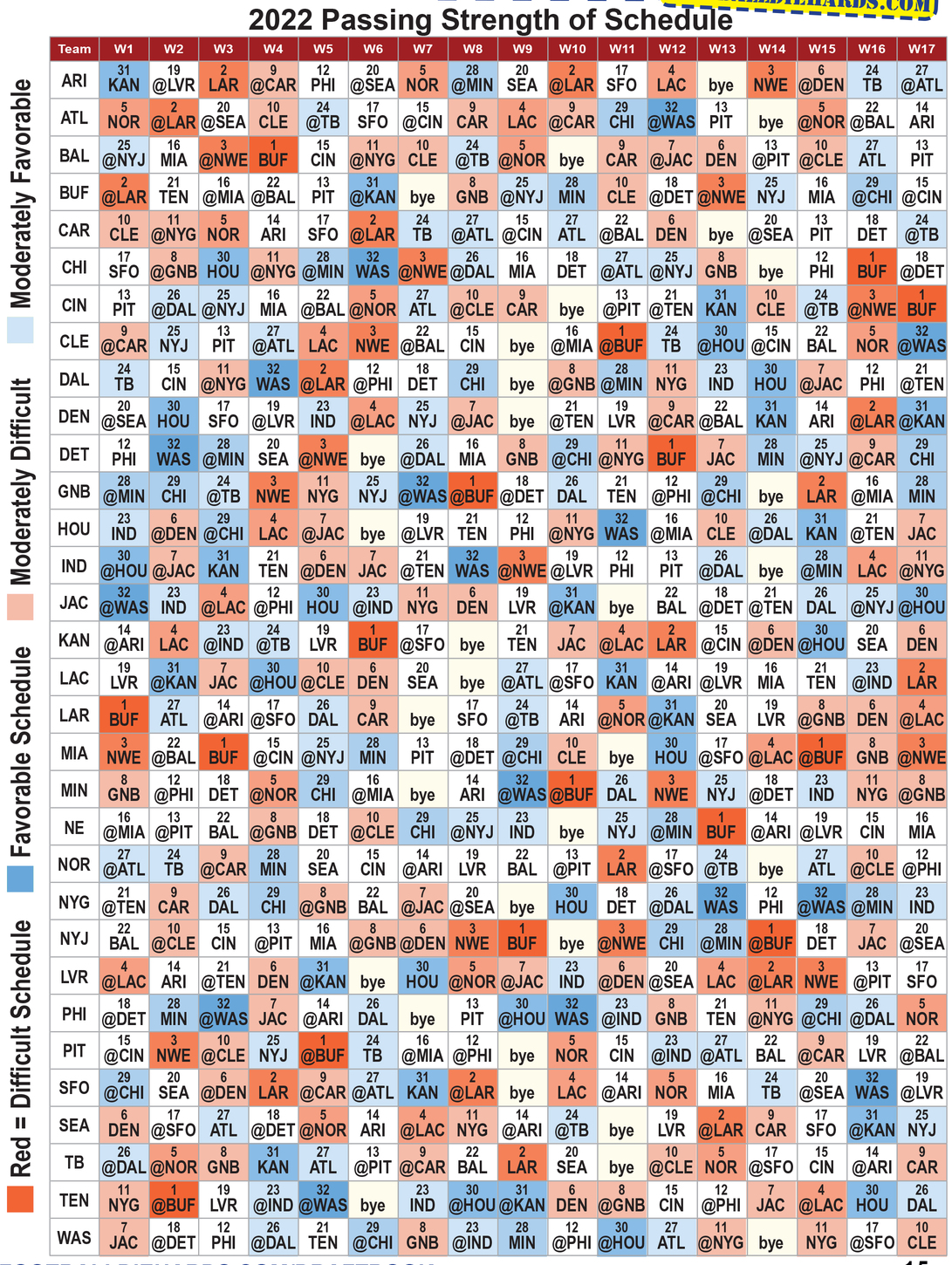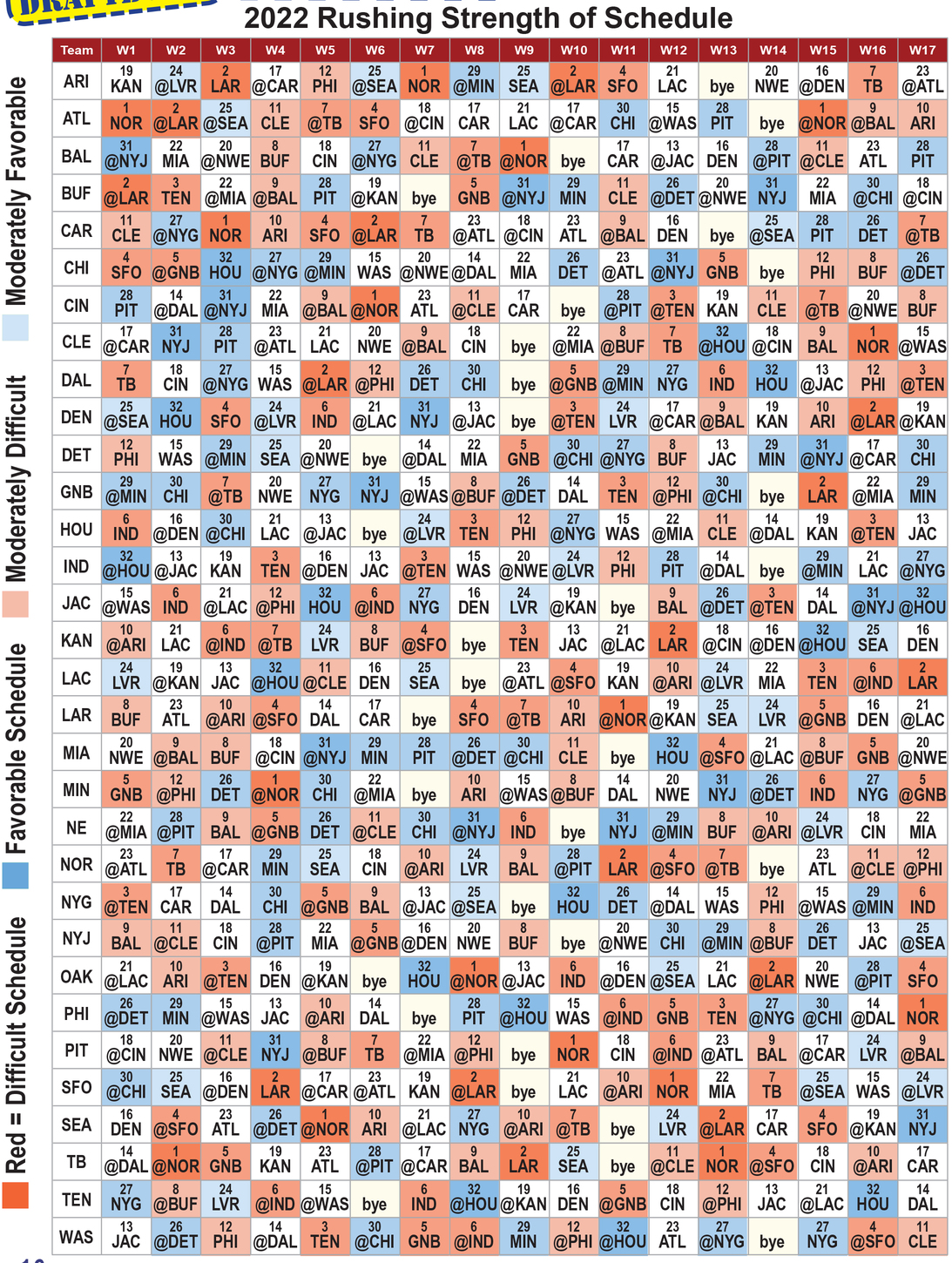Draft Strategies | Depth Charts | Mock Drafts | SOS | Tools | ADP
Diehards Staff Experts Poll | Draft Simulator | University Videos
Using Strength-of-Schedule Analysis to Get Ahead 2022

The Schedules
The color-coded schedules that accompany this article provide a graphic representation of the caliber of passing and rushing defenses each team will play over the course of the season. Projecting a team’s defensive performance for next season begins with analyzing their performance from last season, which I did by finding the average fantasy points allowed in 2021 by opposing defenses to quarterbacks (for passing defense) and to running backs (for rushing defense). Values were assigned to each team based on how far above or below average (in terms of points allowed) they finished last year, and these were then manually adjusted to account for off-season acquisitions, losses, and regime changes. The teams were broken up into nine tiers based on their adjusted values, with each tier given a numeric value. The top and bottom tiers were worth +/-6, the next tier +/-4, then +/-2, then +/-1, and finally a value of zero was given to defenses that fell within five points of the league average.
Overall Rankings (Ease of Schedule)
Taking the entirety of the season into account and putting all thirty-two schedules through a few simple calculations, my overall strength-of-schedule rankings are as follows:
Passing
1. NY Giants: +20
2. Jacksonville: +20
3. Philadelphia: +18
4. Tennessee: +9
5. Houston: +7
6. Indianapolis: +7
7. LA Chargers: +7
8. Washington: +7
9. Denver: +6
10. Dallas: +5
11. Chicago: +2
12. Detroit: +2
13. Green Bay: +2
14. New Orleans: 0
15. Buffalo: 0
16. San Francisco: 0
17. New England: -1
18. Cleveland: -1
19. Minnesota: -4
20. Atlanta: -4
21. Seattle: -4
22. Carolina: -6
23. Cincinnati: -6
24. Tampa Bay: -6
25. LA Rams: -7
26. Las Vegas: -8
27. Pittsburgh: -10
28. Arizona: -10
29. Baltimore: -15
30. Kansas City: -15
31. Miami: -15
32. NY Jets: -20
Rushing
1. Detroit: +11
2. Jacksonville: +9
3. New England: +9
4. Miami: +8
5. Chicago: +8
6. Buffalo: +6
7. Green Bay: +6
8. Indy: +6
9. Washington: +5
10. NY Giants: +3
11. NY Jets: +3
12. Philly: +3
13. Tennessee: +3
14. Cleveland: +1
15. Dallas: 0
16. Minnesota: -1
17. Denver: -1
18. Houston: -3
19. Baltimore: -3
20. Cincinnati: -4
21. LA Chargers: -5
22. Seattle: -7
23. Pittsburgh: -8
24. Kansas City: -8
25. New Orleans: -8
26. Las Vegas: -8
27. Carolina: -10
28. San Francisco: -10
29. LA Rams: -13
30. Arizona: -12
31. Atlanta: -14
32. Tampa Bay: -16
Defensive Landscape
The defensive landscape this year includes an interesting wrinkle that should contextualize the nuggets of insight provided below. It became apparent right off the bat that rushing defenses this season tended to skew closer to the mean than usual, while several passing defenses were a clear step above or below the rest of the league. Consequently, the most actionable SoS data this year is going to have to do with quarterbacks and wide receivers.
On that subject, in an impressive accomplishment, off-season additions to an already-elite unit led to the Buffalo passing defense receiving the first ever perfect score in five iterations of this article. They are what opposing quarterbacks picture in their worst nightmares, and all QBs and WRs who play them during the fantasy playoffs will receive a firm push down my draft board.
This is, it should be noted, an exception to my usual rule. Only defenses towards the very top or bottom of the league are likely to be impactful on a per-game basis (plus the middle of the pack tends to be very unpredictable year-to-year), so the team strength of schedule rankings should really only be used as a tiebreaker. The more valuable insights by far are found by analyzing the full SoS grid itself and identifying players who fall into a few particular archetypes.
Hair Splitters
The common wisdom is that you can’t win your draft in the first couple of rounds, but you can lose it. It’s also the general consensus that when choosing from among the players generally available with the first 20-odd picks, you’re going to be splitting hairs to make your decision. Without further ado, here are some strength-of-schedule-related hairs I uncovered regarding your early picks that just may be worth splitting.
Ja'Marr Chase: Is Ja'Marr Chase an absolute stud? Obviously. Are there other absolute studs that you can draft at his first-round ADP who don’t have to play the Bills in championship week? Very much so. I can easily see a scenario where Jamar is the WR1 on the season but disappoints a lot of championship-contending owners when he runs into a Buffalo buzz saw Week 17. I for one will not be among them, and I recommend you do the same.
Joe Burrow: See above. In Superflex leagues Burrow is a fringe first-rounder (ADP 17), and in the crucial Week 17 he plays against the most formidable passing defense of the past half-decade (at least). There are other QBs going in his ADP range (Dak Prescott and Kyler Murray come to mind) who don’t have this problem, and I would strongly advise drafting them instead.
Austin Ekeler: Like Jamar Chase, Austin Ekeler is an unquestionable stud and a consensus first-round pick. Unfortunately, he also has a similarly nightmarish playoff schedule with three consecutive matchups against top-6 teams (and the second-ranked Rams in championship week). While this isn’t enough reason to avoid him altogether, it may be enough reason to draft someone like Dalvin Cook instead.
De’Andre Swift: I’ve included Swift here because despite his ADP of 19, I believe he deserves consideration in the late first. With game-manager Goff at the helm the Lions’ offense should run through Swift, plus Detroit has an excellent offensive line and has added skilled pass-catchers to keep defenses honest. Swift also has the easiest strength of schedule of any RB in the NFL- a +11 overall with only one matchup against a top-5 defense (the fifth-ranked Packers) and five matchups against the league’s bottom 5 (including two in the playoffs).
Leonard Fournette: Uncle Lenny had an excellent finish to 2021 and looks poised to receive the lion’s share of the Buccaneers’ backfield carries in 2022, leading to a robust second round ADP. While this isn’t a completely ridiculous price point, it is worth noting that the Bucs have the most difficult rushing schedule in the NFL this season. If you’re waffling between Lenny and someone with comparable ADP like the aforementioned De’Andre Swift (or even a WR in that range like CeeDee Lamb), this is worth considering.
Tyreek Hill: With worries about a change of scenery prompting a significant drop in ADP from last year, the NFL’s fastest domestic abuser can be had towards the end of the second round these days. This is still too early, in my opinion. His speed will be neutralized at least in part by Tua’s noted issues throwing the deep ball, and I’m here to tell you that his schedule isn’t going to do him any favors either. The Dolphins have the second-hardest schedule overall against the pass, and their schedule during the fantasy playoff includes the top-ranked juggernaut Bills as well as the third-ranked Patriots and fourth-ranked Chargers. My no-draft list this year features Tyreek at the very top.
AJ Brown: Like Tyreek, this offseason for AJB included a change in scenery and a drop in ADP from last year. Also like Tyreek, he is going towards the end of the second round in drafts. Unlike Tyreek, however, AJ has no record of domestic abuse and no massive dip in quarterback quality to worry about. He also has an extremely favorable schedule that includes five matchups against bottom-5 passing defenses, and is an excellent selection at his ADP.
Stock Market Specials
Everybody wants to draft the next GME, but a big part of winning a fantasy championship is successful in-season trading. Just because you didn’t get in at the floor doesn’t mean you can’t profit. In fact, sometimes you can make more by buying the dip! The following players have stock that could rise and fall fairly predictably based on SoS, and can thus be bought or sold at specific times for maximum profit. Apes to the moon, my friends.
Buying
Lamar Jackson, Week 5: The Ravens start the season off easily enough against the hapless Jets, but in Weeks 3 and 4 they play the third-ranked Patriots and the top-ranked Bills’ pass defenses back-to-back. Coupled with Lamar’s history of inconsistency and the fact that the Ravens are happy to abandon the pass when necessary, I could see reactionary owners looking to move on from their star quarterback if he opens the season underwhelmingly and lays an egg against Buffalo. You can’t always count on this sort of lack of savvy, but you should be ready to take advantage if the opportunity presents itself. It never hurts to make a respectable offer, and Week 5 will be the time to do it.
Tyreek Hill, Week 4: I know, I know. I said all that stuff about Tyreek being on my no-draft list, but here he is on my stock market specials as a “buy.” I’ll explain. However well Tyreek plays this season, I feel confident that he will be at his absolute worst in Weeks 1-3. Not only will he be adjusting to a new team and a new quarterback at that point, but he also plays against the Patriots in Week 1 and the Bills in Week 3. An avalanche of bitterly disappointed Tyreek truthers will be putting him up for sale in Week 4, and whatever your perception of his real value I feel confident that he can be had for less than he’s worth during that window.
Chris Olave, Week 3: The Falcons are going to have a rough year. The Matt Ryan era is over and the QB situation is questionable at best, but first-round rookie Chris Olave looks to be the top WR in Atlanta from Day 1. Call me crazy, but I predict Day 1 will not go so well. During his first two games while he tries to develop game-day chemistry with whomever is throwing him the ball, he will also be dealing with the fifth-ranked Saints and the second-ranked Rams’ passing defenses. I believe that he will struggle and that there will be owners looking to recoup their investment after a rough opening to the season. I also believe that his season will get markedly better from there (both from experience and from much friendlier matchups), and that being there to pick him up at his cheapest is a solid investment.
Cordarrelle Patterson, Week 3: Patterson is already the sort of player who people are expecting to turn back into a pumpkin at any time, and an opening two weeks against the top two rushing defenses in football (Saints and Rams) isn’t likely to help. While I don’t expect the rest of his season to blow anyone away, he should be a viable RB3 and in Week 3 could be as cheap as a throw-in on a larger package or even a waiver wire pickup.
David Montgomery, Week 3: The Bears open the season with back-to-back matchups against top-5 rushing defenses in San Francisco and Packers, which could lead to some tough sledding for Montgomery. Luckily, in Weeks 3-5 he gets to flip the script and play against three rushing defenses that are in the bottom-5. Snap him up prior to Week 3 from any owner impatient enough to consider it and reap the rewards for the rest of the season.
Selling
Tyreek Hill, Trade Deadline: What’s this? I could have sworn I just saw Tyreek on the “buy” list and now here is again listed as a “sell.” It’s no mistake. Due to a particularly unique schedule this season, Hill presents a perfect opportunity to be bought and flipped for profit. As I mentioned before, in his first three weeks he has two brutal matchups against New England and Buffalo. It so happens that in his last three weeks (the fantasy playoffs), he also has two brutal matchups against New England and Buffalo. Buy Reek when he’s cheap in Week 4, use him until the trade deadline, then flip him and get yourself an asset that won’t be completely neutralized come playoffs.
Austin Ekeler, Post-Big Game: You may be a bit surprised to see a consensus top-5 pick on my sell list, but my reasons for including him here are the same reasons he appeared in the previous section. Barring injury I am extremely confident that Ekeler will have a phenomenal regular season. I just worry about his brutal playoff schedule. If you end up with Ekeler one way or another, my advice is to sell him when you perceive his value as being the highest (usually after a particularly good game).
San Francisco 49ers RBs, Weeks 1-16: Making their annual appearance again on my sell list is every 49ers running back. I’m not exactly breaking new ground here by pointing out that Kyle Shanahan is the king of the hot hand and has spent years of his life devising new and creative ways to frustrate fantasy football managers. If you own a 49ers RB who has a big game and you have an opportunity to sell, just do it and thank your lucky stars you got out clean.
Mile Sanders, Week 10: The Eagles have one of the friendliest schedules in the NFL for the first half of the season, culminating in a Week 9 matchup against the bottom-ranked Texans’ rushing defense. Sanders will have every opportunity to thrive and if he does so, nine weeks should be more than enough to rebuild the faith of skeptical managers. His second half of the season, however, is decidedly less friendly. Half of his remaining games are against top-6 rushing defenses, including a date with the top-ranked Rams in Week 17. If you can get a good offer for him around the mid-season mark, jump on it.
Best Ballers
Best Ballers are players whose value in best-ball formats is greater than their value in traditional formats, specifically because their schedule contains a high number of games against easily-shredded defenses (even if some other weeks aren’t so favorable). In best-ball leagues where your leaguemates are drafting based off rankings for traditional formats, target the following for some free added value and a high probability of some big weeks. Their impact matchups and the defensive rankings of those matchups are listed alongside each player’s name.
Jared Goff/Amon-Ra St. Brown: Week 2 Washington (32), Week 3 Minnesota (28), Week 10 Chicago (29), Week 14 Minnesota (28), Week 17 Chicago (29)
Aaron Rodgers/Christian Watson/Robert Tonyan: Week 1 Minnesota (28), Week 2 Chicago (29), Week 7 Washington (32), Week 13 Chicago (29), Week 17 Minnesota (28)
Daniel Jones/Kadarius Toney/Kenny Golladay: Week 4 Chicago (29), Week 10 Houston (30), Week 13 Washington (32), Week 15 Washington (32), Week 16 Minnesota (28)
Jalen Hurts/AJ Brown/Devonta Smith/Dallas Goedert: Week 2 Minnesota (28), Week 3 Washington (32), Week 9 Houston (30), Week 10 Washington (32), Week 15 Chicago (29)
Devin Singletary/James Cook: Week 5 Pittsburgh (28), Week 9 NY Jets (31), Week 10 Minnesota (29), Week 14 NY Jets (31), Week 16 Chicago (30)
D’Andre Swift: Week 3 Minnesota (29), Week 10 Chicago (30), Week 14 Minnesota (29), Week 15 NY Jets (31), Week 17 Chicago (30)
Aaron Jones: Week 1 Minnesota (29), Week 2 Chicago (30), Week 6 NY Jets (31), Week 13 Chicago (30), Week 17 Minnesota (29)
Damien Harris: Week 2 Pittsburgh (28), Week 7 Chicago (30), Week 8 NY Jets (31), Week 11 NY Jets (31), Week 12 Minnesota (29)
Playoff Pariahs & Golden Gods
Perhaps the most significant way in which strength of schedule can play a part in your fantasy season is in determining who your players have to line up against in those crucial Weeks 14-17. Those who find themselves across from elite defenses like the Bills and could hamper you in your hunt for glory are dubbed Playoff Pariahs, while those playing teams like the Commanders have the potential to be championship-clinching Golden Gods, a la the immortal Dennis Reynolds. Playoff matchups for each player and their respective rankings are listed alongside their names.
Golden Gods
D’Andre Swift: Week 14 Minnesota (29), Week 15 NY Jets (31), Week 16 Carolina (17), Week 17 Chicago (30)
James Robinson/Travis Etienne: Week 14 Tennessee (3), Week 15 Dallas (18), Week 16 NY Jets (31), Week 17 Houston (32)
Daniel Jones/Kadarius Toney/Kenny Golladay: Week 14 Philadelphia (12), Week 15 Washington (32), Week 16 Minnesota (28), Week 17 Indianapolis (23)
Jared Goff/Jameson Williams/Amon-Ra St. Brown: Week 14 Minnesota (28), Week 15 NY Jets (25), Week 16 Carolina (9), Week 17 Chicago (29)
Playoff Pariahs
Joe Burrow/Jamar Chase/Tee Higgins: Week 14 Cleveland (10), Week 15 Tampa Bay (24), Week 16 New England (3), Week 17 Buffalo (1)
Tua Tagovailoa/Tyreek Hill/Jaylen Waddle: Week 14 LA Chargers (4), Week 15 Buffalo (1), Week 16 Green Bay (8), Week 17 New England (3)
Derek Carr/Davante Adams/Hunter Renfrow/Darren Waller: Week 14 LA Rams (2), Week 15 New England (3), Week 16 Pittsburgh (13), Week 17 San Francisco (17)
Austin Ekeler: Week 14 Miami (22), Week 15 Tennessee (3), Week 16 Indy (6), Week 17 LA Rams (2)
Nick Chubb: Week 14 Cincinnati (18), Week 15 Baltimore (9), Week 16 New Orleans (1), Week 17 Washington (15)
In closing, avoid the Buffalo defense. Seriously. Best of luck in all of your seasons unless you are in my leagues, and I hope this guide has provided some useful knowledge that you can use to bring your league-mates to the point of tears and object-throwing.
Passing SOS Matrix

Rushing SOS Matrix

